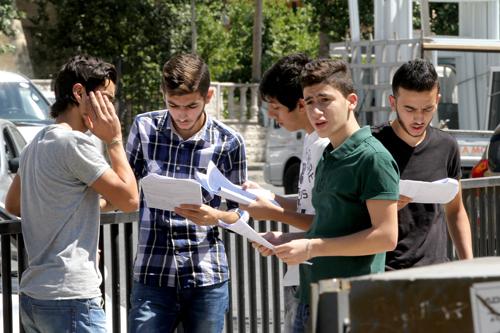You are here
Education experts criticise use of Tawjihi as sole decider of students' future
By Laila Azzeh - Jan 06,2016 - Last updated at Jan 06,2016
AMMAN — Having the General Secondary Education Certificate Examination (Tawjihi) as the only criterion to define students' future makes it a "terrorising" and "irrational" experience, according to education experts.
"You cannot give students material that requires 14 months to digest and expect them to master it in less than eight months," Thouqan Obeidat, an educational expert and former secretary general of the Education Ministry, said at a recent seminar to discuss the future of Tawjihi.
Obeidat added that Tawjihi does not take into account the differences in students' abilities and is not designed in a way that equips them for the future.
"The huge amount of material that students have to study in a few months makes the Tawjihi year a very painful and terrifying one," he noted, saying that it is "unacceptable for a country to have 90,000 students failing the national high school exam".
"Jordanians should not be silent over this."
Students' score in Tawjihi decides whether they can apply to university and what major they can enrol in.
Suggesting alternatives, Obeidat said 40 per cent of the score could be determined by the school, 30 per cent according to a general exam and 30 per cent for critical thinking skills, "or universities can identify certain topics that students need to pass in the Tawjihi in order to enrol in their different programmes".
He called for establishing an independent entity responsible for the Tawjihi exam.
Former education minister Fayez Saudi agreed with Obeidat's views, stressing that the overall Jordanian curricula is "incompetent" and does not graduate quality students.
"Tawjihi is only one year, but the problem with education goes back way earlier. Education's outcomes are really bad," he said.
Saudi described as a "catastrophe the fact that 900 public schools are rented, as these buildings are not equipped to serve as an educational environment".
At the seminar, organised by the National Campaign for Defending Students' Rights (Thabahtoona), Jordan Teachers Association President Hussam Masheh attributed the "weak" educational system to the overall status of teachers, whose number exceeds 150,000.
"Teachers are excluded from having a say in any educational reform plan although they know better because they are the ones in the field," he said, citing the increasing number of attacks on teachers, standing at 100 in 2015, as an example of the way society perceives educators.
"It should be underlined that the dignity of teachers is part of the dignity of the country as a whole," Masheh stressed.
Other education experts criticised the Education Ministry's plan to hold one Tawjihi examination session every year, instead of two, starting from the 2016/17 academic year.
"Without changing the curricula and the type of the exam, this measure would only increase anxiety surrounding Tawjihi," noted Ghazi Khader, a quality education expert.
Thabahtoona President Fakher Daas concurred, describing the step "as farthest away from developing the exam".
In earlier remarks, Education Minister Mohammad Thneibat said holding one Tawjihi session per year will have a positive impact on students, since they will be tested in fewer courses.
Students will be tested for some courses only at their schools, while fewer subjects will be counted in the Tawjihi score, Thneibat explained.
The two-session examination system costs the ministry around JD25 million, with each session requiring over four-and-a-half months of preparation.
Related Articles
AMMAN — Penalties against violators of the General Secondary Education Certificate Examination (Tawjihi) remain a point of controversy for e
AMMAN — The Jordan Teachers Association (JTA) and several students on Saturday criticised a recent decision to hold the General Secondary Ce
AMMAN — An MP on Sunday sent a memo to Education Minister Mohammad Thneibat complaining about the maths exam for the scientific stream in th

















